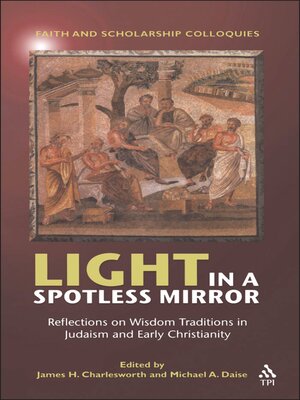Light in a Spotless Mirror
ebook ∣ Reflections on Wisdom Traditions in Judaism and Early Christianity · Faith and Scholarship Colloquies
By James H. Charlesworth

Sign up to save your library
With an OverDrive account, you can save your favorite libraries for at-a-glance information about availability. Find out more about OverDrive accounts.
Find this title in Libby, the library reading app by OverDrive.



Search for a digital library with this title
Title found at these libraries:
| Loading... |
After the death of Alexander the Great in 323 B.C.E., Jewish scholars, especially those in Jerusalem and Alexandria, turned increasingly to the eternal questions that define those who reflect on human life. These sages sought to comprehend the origin and essence of things and pondered how it was possible to learn and obtain insight. Wisdom, they came to see, was the "fashioner of all things" who disclosed "what is secret and what is manifest." Many of these Jewish intellectuals saw Wisdom as the closest being to God.
In this book, five of the world's foremost scholars in the field reflect on the Wisdom traditions in Second Temple Judaism and earliest Christianity.
Roland Murphy (late of Duke University) explores the biblical and Jewish wisdom literature, and focuses on ways that Jews sought to understand sin and suffering.
Peter Schäfer (Princeton University) argues that the association of Wisdom, Torah, and Israel found in biblical literature was taken up much later in the writings of the Rabbinic sages.
Peder Borgen (formerly University of Trondheim, Norway) examines the similarities in the writings of the Hellenistic Jewish Wisdom teacher Philo of Alexandria and the writer of the Gospel of John.
D. Moody Smith (Duke University) focuses on the Passion narrative in the Gospel of John as he demonstrates how much John relies on Jewish Wisdom tradition in his gospel.
James Charlesworth (PrincetonTheological Seminary) examines the Wisdom aspects of some Jewish apocalypses in order to demonstrate that the Gospel of John draws upon both the Jewish Wisdom literature and Jewish apocalypses.
James H. Charlesworth is George L. Collord Professor of New Testament Language and Literature at Princeton Theological Seminary, director of the seminary's Dead Sea Scrolls Project, and co-editor of the Trinity Press Faith and Scholarship Colloquies (FSC) series.
Michael A. Daise is Assistant Professor of Religion at The College of William and Mary and has published articles on the Old Testament Pseudepigrapha and the Dead Sea Scrolls.
In this book, five of the world's foremost scholars in the field reflect on the Wisdom traditions in Second Temple Judaism and earliest Christianity.
Roland Murphy (late of Duke University) explores the biblical and Jewish wisdom literature, and focuses on ways that Jews sought to understand sin and suffering.
Peter Schäfer (Princeton University) argues that the association of Wisdom, Torah, and Israel found in biblical literature was taken up much later in the writings of the Rabbinic sages.
Peder Borgen (formerly University of Trondheim, Norway) examines the similarities in the writings of the Hellenistic Jewish Wisdom teacher Philo of Alexandria and the writer of the Gospel of John.
D. Moody Smith (Duke University) focuses on the Passion narrative in the Gospel of John as he demonstrates how much John relies on Jewish Wisdom tradition in his gospel.
James Charlesworth (PrincetonTheological Seminary) examines the Wisdom aspects of some Jewish apocalypses in order to demonstrate that the Gospel of John draws upon both the Jewish Wisdom literature and Jewish apocalypses.
James H. Charlesworth is George L. Collord Professor of New Testament Language and Literature at Princeton Theological Seminary, director of the seminary's Dead Sea Scrolls Project, and co-editor of the Trinity Press Faith and Scholarship Colloquies (FSC) series.
Michael A. Daise is Assistant Professor of Religion at The College of William and Mary and has published articles on the Old Testament Pseudepigrapha and the Dead Sea Scrolls.






